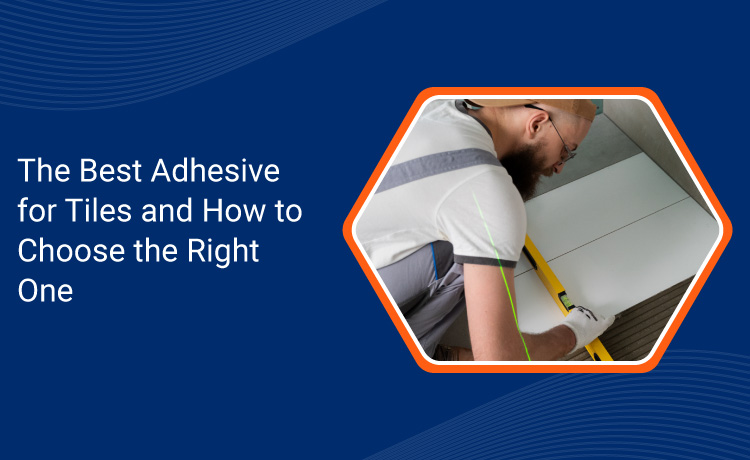 March 13, 2025
March 13, 2025
If you are working on a project you will need various types of adhesives to fix tiles in different places. Selecting the best adhesive for tiles for a particular use is essential for a clean finish and strong bond. While this may seem like a very trivial thing at first, selecting the right adhesive according to the tile and the working area is critical.
In this blog, we will explain the different types of adhesive for tile fixing, and factors to consider when choosing an adhesive, and we will also help you select the best adhesive for different uses. But first, let us take a look at what tile-fixing adhesives are.
Tile-fixing adhesives are specialised cement based polymerised adhesives or resin based adhesives that are used to fix tiles of different materials and dimensions. These tile adhesives enhance the bonding strength of the tiles to the surface. Tile adhesives are available in various formulations to cater to the different bond needs. Traditionally, cement was used to bond tiles with the surface; however, once dried, cement shrinks and leaves a lot of pores below the surface causing the tiles to easily crack. Adhesives are specially formulated to maximise bond strength and prevent the tile from chipping. Adhesives are also lighter than cement and mortar, preventing additional pressure on the building.
Polymer-modified cementitious tile adhesives (PMCTA) also known as thin-set mortars are generally used to fix vitrified, ceramic and natural stone tiles. They are extremely versatile and widely used by professionals for fixing tiles on the floor as well as walls. They have a waterproof barrier and are extremely flexible, ensuring strong bonds even in moisture-prone areas like bathrooms and kitchens.
Flexible floor tile adhesives are best suited for substrates that expand and contract a lot in day-to-day activities. These adhesives accommodate the movement of the substrate without compromising on strength and durability. In extremely high-footfall areas, ordinary adhesives may be too rigid and may crack under pressure. Flexible floor adhesives evenly distribute the stress across the tile.
Epoxy-based/ PU-based tile adhesives are extremely strong, durable, resilient, and versatile. Epoxies are also waterproof making them an excellent choice for fixing tiles around the house. One of the key properties of epoxy adhesives is that they can create strong bonds with almost any material. Hence, they are the best floor tile adhesive for tiling on walls, metal substrates, and stones. They are also economical in the short term as well as in the long run.
Tile-on-tile adhesives are a special type of bonding material that allows you to install new tiles directly onto existing ones. This method is often used during renovation to save time and money. Installing tiles without removing previous ones also eliminates the mess of demolition and keeps the structure safe. Tile on tiles adhesives are very effective and durable.
Bathroom and kitchen floors and walls are constantly in touch with water, water-based products, and moisture. Tiles are at risk of getting damaged from the inside and falling apart due to water damage, mould, and dampness. Cementitious tile adhesives like MCON Mortar and MCON NSA White Gold are best suited for such applications. These adhesives give ample work time to ensure tiles are fit perfectly and once dried, they provide excellent strength and water resistance.
Tiles used in outdoor settings like terraces, outer walls, swimming pools, and driveways are constantly facing extreme weather conditions, including rain, sun, and temperature fluctuations. As a result, you need to use adhesive with thermal expansion and water resistance properties. These adhesives facilitate expansion and contraction without cracking. Flexible floor tile adhesives would be a good choice for such applications.
Large-format tiles require adhesives with superior bonding strength with the capacity to hold the tile in place during installation. Adhesives like (MCon NSA Grey No Limit) MCON TILE GROUT EP are suitable options for fixing large format tiles effectively and efficiently. You can also use slow-setting adhesives if you want to ensure perfect fit.
Decorative and glass tiles require adhesives that do not compromise their aesthetics. You need to use transparent, non-staining adhesives that do not discolour the tiles. The adhesive must also be flexible and durable to accommodate environmental elements. Clear epoxy or cementitious adhesives would be the best choice for this type of application.
Tile adhesives are the modern alternative to using cement and mortar for fixing tiles securely. Choosing the right tile adhesives is critical for ensuring longevity and durability. Polymer-modified cementitious tile adhesives (PMCTA) are among the most popular and effective tile adhesives available in the market. However, you need to consider factors such as type of floor tile, substrate, application area, and more to pick the right adhesive.
If you are looking for the perfect adhesive for your tiling project, get in touch with us today. MCon Rasayan is always here to help you!